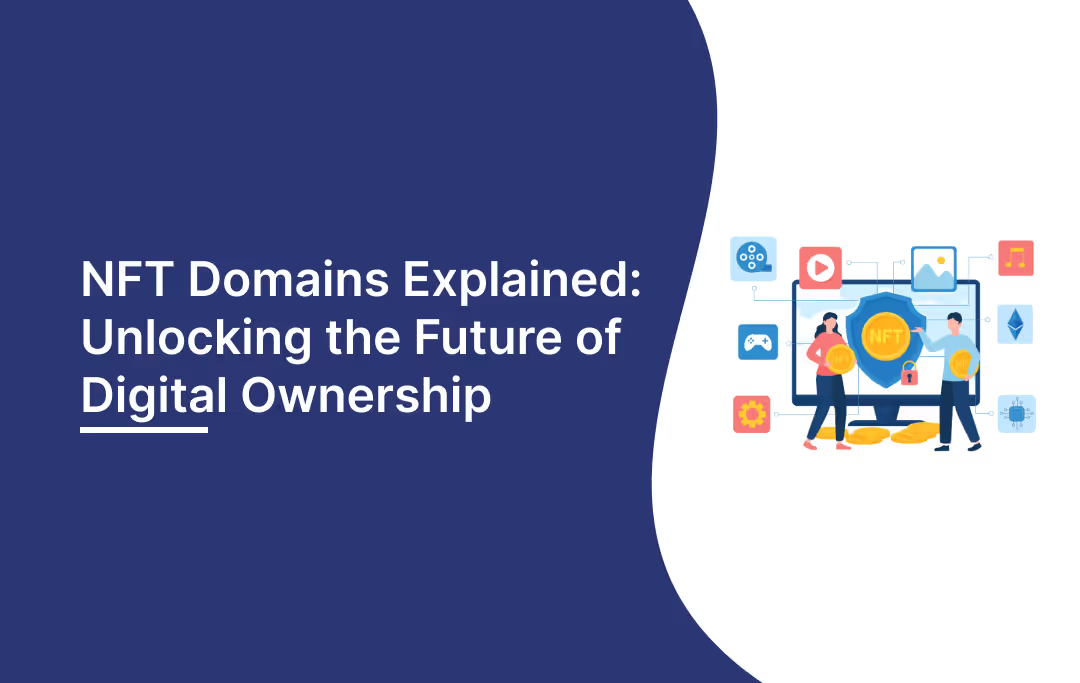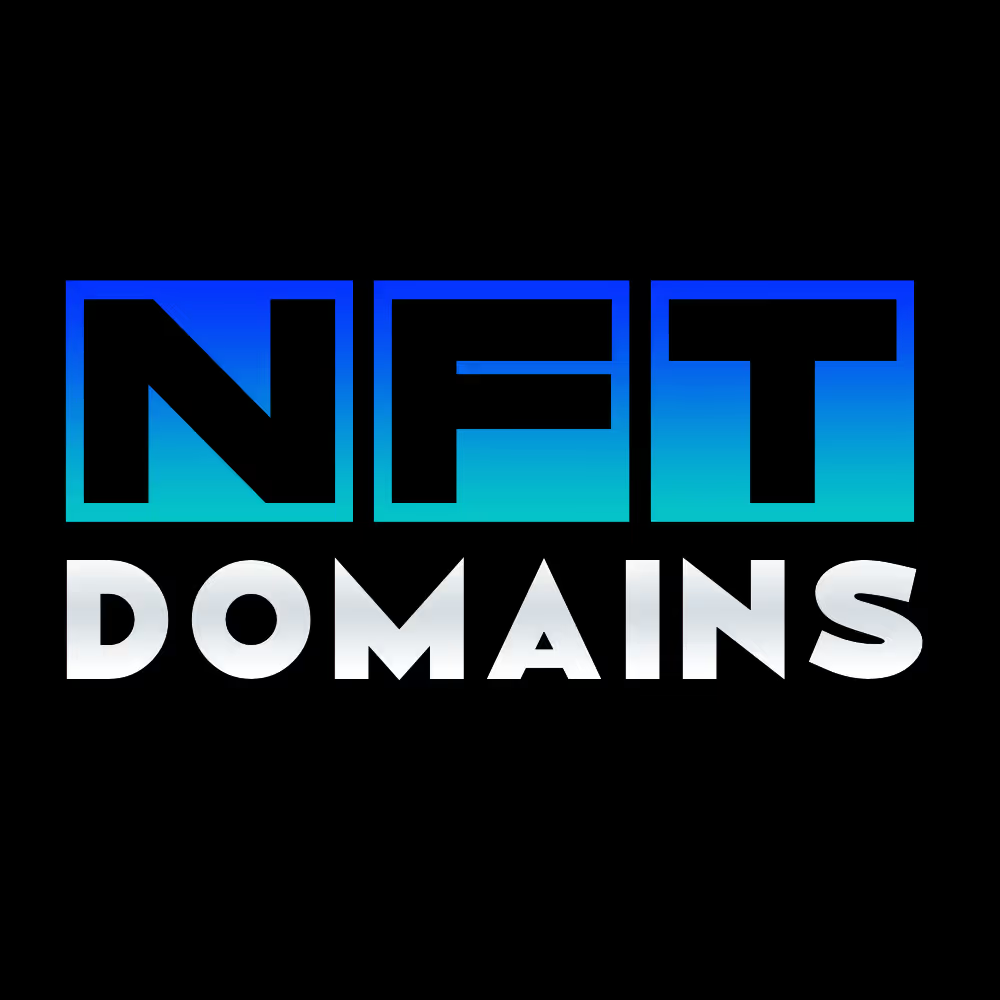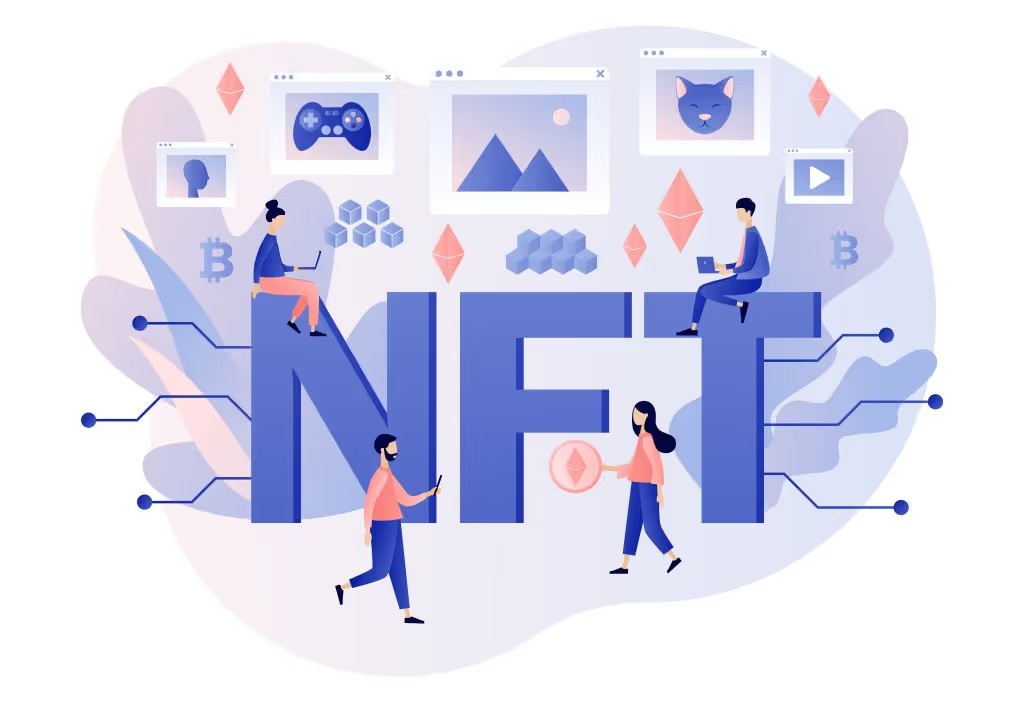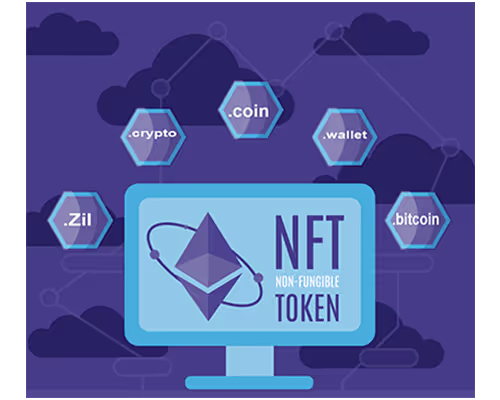.avif)
Calculate Your Crypto
Taxes in Minutes

The digital landscape is constantly evolving, and one of the most exciting developments in recent years has been the rise of non-fungible tokens (NFTs). Within the realm of NFTs, a fascinating concept has emerged—NFT domains. In this comprehensive guide, we will delve into the world of NFT domains, exploring their definition, unique properties, and potential impact on the future of digital ownership.
Understanding NFTs
Non-Fungible Tokens (NFTs) have taken the digital world by storm, revolutionizing the concept of ownership and authentication. Unlike cryptocurrencies such as Bitcoin or Ethereum, which are fungible and interchangeable, NFTs represent unique digital assets. Each NFT has a distinct value, ownership history, and set of metadata attached to it, making it one-of-a-kind and verifiable on the blockchain. NFTs can represent various forms of digital content, including artwork, music, videos, virtual real estate, and more. The underlying technology of NFTs is typically based on blockchain networks like Ethereum, which ensure transparency, security, and decentralization.
What are NFT Domains?
NFT domains are an innovative extension of the NFT ecosystem. Similar to traditional domain names used for website addresses, NFT domains offer unique and memorable digital identities on the blockchain. These domains, represented as NFTs, enable individuals and businesses to establish verifiable and censorship-resistant online presence. NFT domains operate on the same principles as NFTs, utilizing smart contracts to define ownership, transferability, and associated metadata. By owning an NFT domain, individuals have control over their digital identity and can seamlessly integrate it with various decentralized web services and applications.

How NFT Domains Work
NFT domains operate on the underlying infrastructure of blockchain technology. Smart contracts, built on blockchain networks like Ethereum, define the rules and properties of NFT domains, ensuring transparency, security, and immutability. These smart contracts enable the creation, ownership, and transfer of NFT domains, eliminating the need for intermediaries. NFT domain marketplaces and platforms serve as gateways for users to discover, buy, sell, and manage their NFT domains seamlessly. The integration of blockchain wallets allows users to interact with their NFT domains, accessing decentralized web services and showcasing digital assets. NFT domains are revolutionizing the concept of digital ownership, offering verifiable and censorship-resistant identities on the decentralized web.
Use Cases for NFT Domains
NFT domains have a wide range of use cases and applications. They can be used to create personalized websites, serve as digital art galleries, host decentralized applications (dApps), establish virtual real estate, and even represent ownership of virtual goods within metaverses. NFT domains offer branding opportunities, enabling businesses to establish unique and recognizable digital identities. Artists and creators can showcase their work and monetize it directly through NFT domains. Moreover, NFT domains facilitate the creation of decentralized social media platforms, where individuals have ownership and control over their data and interactions.

NFT Domain Taxation:
Taxation is an important consideration when dealing with NFT domains. The tax implications for NFT domain transactions can vary depending on factors such as your jurisdiction and the nature of the transactions involved. It is crucial to understand your tax obligations and seek professional advice to ensure compliance and optimize your tax position. Reporting requirements for NFT domain transactions may differ from traditional assets, so it is important to stay informed about the latest tax regulations specific to NFTs. By addressing taxation matters properly, you can navigate the evolving landscape of NFTs and avoid any potential pitfalls associated with tax compliance.
How to Create an NFT Domain with Unstoppable Domains
Creating an NFT domain with Unstoppable Domains is a straightforward and exciting process. Unstoppable Domains simplifies the registration, minting, and management of NFT domains, empowering individuals and businesses to establish unique and verifiable digital identities on the blockchain. By following a few simple steps, you can create your own NFT domain and harness its numerous benefits. Unstoppable Domains provides a user-friendly interface and seamless integration with blockchain wallets, making it accessible to both newcomers and experienced users alike. With Unstoppable Domains, you can unlock the potential of NFT domains and explore the world of decentralized digital ownership.
Legal and Intellectual Property Considerations
As with any digital asset, legal and intellectual property considerations are important in the realm of NFT domains. Creators should be aware of copyright infringement issues when minting and selling NFTs based on existing works. Clearing rights and obtaining permissions for using copyrighted content is essential to avoid legal complications. Additionally, proper attribution and metadata management are crucial for maintaining the integrity and authenticity of NFT domains. It is advisable for creators and buyers to consult legal professionals who specialize in blockchain and intellectual property law to navigate the complexities and ensure compliance with existing regulations.

NFT Domains and the Future of the Internet
NFT domains have the potential to reshape the internet as we know it. By offering decentralized and secure alternatives to traditional domain names, NFT domains enable individuals and businesses to truly own and control their digital identities. They empower creators to showcase their work, enable new forms of digital expression, and create unique branding opportunities. Moreover, NFT domains open doors to decentralized web services and the creation of immersive virtual worlds. As blockchain technology continues to advance, NFT domains can foster a more inclusive and equitable internet, where users have greater autonomy and ownership over their online presence.
Challenges and Criticisms of NFT Domains
While NFT domains hold immense promise, they are not without challenges and criticisms. One major concern is the environmental impact of blockchain networks. Critics argue that the energy consumption required for mining and validating transactions on the blockchain is unsustainable. Another challenge is the need for clearer regulations and standards in the NFT domain space. As the technology evolves, it is essential to establish frameworks that protect creators' rights, prevent fraud, and ensure fair practices. Additionally, ethical considerations arise, such as cultural appropriation, when NFT domains represent aspects of cultural heritage. Addressing these challenges and criticisms will be crucial for the long-term success and acceptance of NFT domains.

Conclusion
In conclusion, NFT domains represent a fascinating intersection of blockchain technology, digital ownership, and creative expression. By leveraging the power of NFTs, individuals, artists, businesses, and the broader internet community can redefine ownership, enhance brand experiences, and unlock the potential of decentralized web services. As NFT domains continue to evolve, it is crucial to stay informed, adapt to emerging trends, and explore the immense possibilities they offer in shaping the future of the digital landscape.
FAQs
1. What is an NFT domain?
An NFT domain is a domain name that is associated with a non-fungible token (NFT). It combines the traditional concept of domain names with the unique properties and ownership verification provided by blockchain technology.
2. Can I buy domains with .NFT endings?
Yes, it is possible to buy domains with .NFT endings. Some domain registrars and platforms offer the option to purchase NFT domains, allowing users to acquire and own domain names as NFT assets.
3. How does an NFT domain work?
An NFT domain works by associating a domain name with a non-fungible token on a blockchain. The NFT represents the ownership and control of the domain name. The blockchain provides a decentralized and transparent record of ownership, ensuring that the domain's ownership can be verified and transferred securely.
4. What are the best domains for NFT?
The best domains for NFT are subjective and depend on individual preferences and specific use cases. However, popular choices for NFT domains often include short and memorable names, brandable terms, or domains related to specific industries, interests, or communities. The value of NFT domains can also be influenced by factors such as scarcity, demand, and the uniqueness of the domain name.
All content on Kryptos serves general informational purposes only. It's not intended to replace any professional advice from licensed accountants, attorneys, or certified financial and tax professionals. The information is completed to the best of our knowledge and we at Kryptos do not claim either correctness or accuracy of the same. Before taking any tax position / stance, you should always consider seeking independent legal, financial, taxation or other advice from the professionals. Kryptos is not liable for any loss caused from the use of, or by placing reliance on, the information on this website. Kryptos disclaims any responsibility for the accuracy or adequacy of any positions taken by you in your tax returns. Thank you for being part of our community, and we're excited to continue guiding you on your crypto journey!
| Step | Form | Purpose | Action |
|---|---|---|---|
| 1 | 1099-DA | Reports digital asset sales or exchanges | Use to fill out Form 8949. |
| 2 | Form 1099-MISC | Reports miscellaneous crypto income | Use to fill out Schedule 1 or C. |
| 3 | Form 8949 | Details individual transactions | List each transaction here. |
| 4 | Schedule D | Summarizes capital gains/losses | Transfer totals from Form 8949. |
| 5 | Schedule 1 | Reports miscellaneous income | Include miscellaneous income (if not self-employment). |
| 6 | Schedule C | Reports self-employment income | Include self-employment income and expenses. |
| 7 | Form W-2 | Reports wages (if paid in Bitcoin) | Include wages in total income. |
| 8 | Form 1040 | Primary tax return | Summarize all income, deductions, and tax owed. |
| Date | Event/Requirement |
|---|---|
| January 1, 2025 | Brokers begin tracking and reporting digital asset transactions. |
| February 2026 | Brokers issue Form 1099-DA for the 2025 tax year to taxpayers. |
| April 15, 2026 | Deadline for taxpayers to file their 2025 tax returns with IRS data. |
| Timeline Event | Description |
|---|---|
| Before January 1, 2025 | Taxpayers must identify wallets and accounts containing digital assets and document unused basis. |
| January 1, 2025 | Snapshot date for confirming remaining digital assets in wallets and accounts. |
| March 2025 | Brokers begin issuing Form 1099-DA, reflecting a wallet-specific basis. |
| Before Filing 2025 Tax Returns | Taxpayers must finalize their Safe Harbor Allocation to ensure compliance and avoid penalties. |
| Feature | Use Case Scenario | Technical Details |
|---|---|---|
| Automated Monitoring of Transactions | Alice uses staking on Ethereum 2.0 and yield farming on Uniswap. Kryptos automates tracking of her staking rewards and LP tokens across platforms. | Integrates with Ethereum and Uniswap APIs for real-time tracking and monitoring of transactions. |
| Comprehensive Data Collection | Bob switches between liquidity pools and staking protocols. Kryptos aggregates all transactions, including historical data. | Pulls and consolidates data from multiple sources and supports historical data imports. |
| Advanced Tax Categorization | Carol earns from staking Polkadot and yield farming on Aave. Kryptos categorizes her rewards as ordinary income and investment income. | Uses jurisdiction-specific rules to categorize rewards and guarantee compliance with local tax regulations. |
| Dynamic FMV Calculation | Dave redeems LP tokens for Ethereum and stablecoins. Kryptos calculates the fair market value (FMV) at redemption and during sales. | Updates FMV based on market data and accurately calculates capital gains for transactions. |
| Handling Complex DeFi Transactions | Eve engages in multi-step DeFi transactions. Kryptos tracks value changes and tax implications throughout these processes. | Manages multi-step transactions, including swaps and staking, for comprehensive tax reporting. |
| Real-Time Alerts and Updates | Frank receives alerts on contemporary tax regulations affecting DeFi. Kryptos keeps him updated on relevant changes in tax laws. | Observe regulatory updates and provide real-time alerts about changes in tax regulations. |
| Seamless Tax Reporting Integration | Grace files taxes using TurboTax. Kryptos integrates with TurboTax to import staking and yield farming data easily. | Direct integration with tax software like TurboTax for smooth data import and multi-jurisdictional reporting. |
| Investor Type | Impact of Crypto Tax Updates 2025 |
|---|---|
| Retail Investors | Standardized crypto reporting regulations make tax filing easier, but increased IRS visibility raises the risk of audits. |
| Traders & HFT Users | To ensure crypto tax compliance, the IRS is increasing its scrutiny and requiring precise cost-basis calculations across several exchanges. |
| Defi & Staking Participants | The regulations for reporting crypto transactions for staking rewards, lending, and governance tokens are unclear, and there is a lack of standardization for decentralized platforms. |
| NFT Creators & Buyers | Confusion over crypto capital gains tax in 2025, including the taxation of NFT flips, royalties, and transactions across several blockchains. |
| Crypto Payments & Businesses | Merchants who take Bitcoin, USDC, and other digital assets must track crypto capital gains for each transaction, which increases crypto tax compliance requirements. |
| Event | Consequences | Penalties |
|---|---|---|
| Reporting Failure | The tax authorities can mark uncontrolled revenues and further investigate. | Penalty fines, interest on unpaid taxes and potential fraud fees if they are deliberately occurring. |
| Misreporting CGT | Misreporting CGT Error reporting profits or losses can trigger the IRS audit. | 20% fine on under -ported zodiac signs, as well as tax and interest. |
| Using decentralized exchanges (DEXs) or mixers without records | The IRS can track anonymous transactions and demand documentation. | Possible tax evasion fee and significant fine. |
| Disregarding Bitcoin mining tax liabilities | Mining reward is considered taxable income, and failure of the report can be regarded as tax fraud. | Further tax obligations, punishment and potential legal steps. |
| Foreign crypto holdings: Non-disclosure | Foreign-accepted crypto FATCA may be subject to reporting rules. | Heavy fines (up to $ 10,000 per fracture) or prosecution for intentional non-transport. |
File Your Crypto Tax in Minutes










